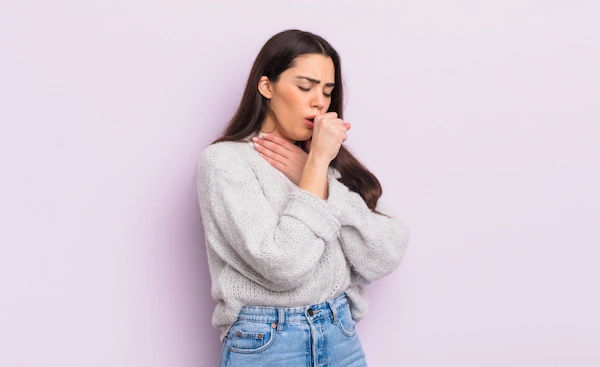How To Reduce Phlegm In Throat At Night?
Reduce nighttime phlegm with diet, home remedies, and lifestyle changes. Learn how to manage mucus build-up, improve sleep, and address underlying causes.

Written by Dr.Sonia Bhatt
Last updated on 3rd Jul, 2025

Struggling with excess phlegm in your throat at night? It can be uncomfortable, disrupt your sleep, and lead to persistent coughing. Phlegm is a thick mucus produced by your respiratory system to trap irritants, but when it builds up excessively, it can cause throat discomfort and congestion. Understanding its causes and symptoms can help you manage and reduce it effectively.
Your respiratory tract naturally produces phlegm to protect your airways from dust, allergens, and infections. Unlike saliva, phlegm is thicker and tends to increase when your body is fighting an infection or reacting to irritants. Excess phlegm often leads to frequent throat clearing, persistent coughing, and a heavy sensation in the chest.
You may also experience difficulty swallowing, postnasal drip, or hoarseness due to continuous throat irritation. Recognising these symptoms early can help you take proactive steps to prevent nighttime discomfort and improve your overall respiratory health.
Nighttime Phlegm Challenges
Excessive phlegm at night can make it harder for you to breathe and sleep comfortably. When mucus builds up in your throat, it can lead to coughing, irritation, and disrupted rest. Understanding why this happens can help you take the right steps to manage it effectively.
Why Phlegm Increases at Night
Your body slows down mucus clearance while you sleep, causing phlegm to build up in your throat. If you have allergies, acid reflux, or dry air in your bedroom, your mucus production may increase even more. Reduced swallowing at night also makes it harder for your body to clear the excess mucus, leading to congestion.
Effects of Lying Down on Phlegm
If you notice more throat discomfort while lying down, your sleeping position may be contributing to the problem. When you lie flat, mucus pools in your throat instead of draining properly. This can result in:
Postnasal drip that causes throat irritation
Nasal congestion that makes breathing difficult
Increased coughing and throat clearing that disrupt sleep
Impact on Sleep Quality
Excess phlegm can make it difficult to fall asleep and stay asleep. If you frequently wake up due to throat discomfort, coughing, or difficulty breathing, your sleep quality may be affected. Severe mucus build-up can also lead to snoring or frequent awakenings. Managing nighttime phlegm is essential for improving both your breathing and sleep.
Lifestyle Modifications to Reduce Phlegm
If you experience excessive phlegm in your throat at night, making small lifestyle changes can help reduce mucus build-up and improve your breathing. Simple adjustments in your diet, hydration, and daily habits can prevent discomfort and allow for a more restful sleep.
Dietary Changes to Prevent Phlegm
Certain foods can either increase or reduce mucus production. To minimise phlegm build-up, you should avoid dairy products, fried foods, and processed sugars. Instead, include anti-inflammatory foods such as ginger, garlic, turmeric, and citrus fruits in your meals. Spicy foods can also help clear nasal passages and break down mucus.
Hydration and Its Role in Mucus Reduction
Drinking enough fluids throughout the day helps thin mucus, making it easier for your body to clear. Warm herbal teas, broths, and plain water can soothe your throat and prevent thick phlegm from accumulating at night. Avoid excessive caffeine and alcohol, as they can cause dehydration and lead to thicker mucus.
Smoking Cessation and Reducing Phlegm Production
If you smoke, quitting can significantly reduce phlegm production. Smoking irritates the respiratory tract and increases mucus build-up, leading to persistent congestion. Avoiding second-hand smoke and air pollutants can also help improve lung function and reduce throat discomfort caused by excessive mucus.
Home Remedies and Techniques
If you struggle with phlegm build-up at night, simple home remedies can help clear mucus and improve breathing. Using steam, adjusting your sleep position, and maintaining proper humidity in your bedroom can prevent discomfort and promote restful sleep.
Importance of Steam Inhalation
Inhaling steam helps loosen thick mucus and open up your airways. If you take a hot shower before bed or inhale steam from a bowl of hot water, it can provide instant relief. Adding essential oils like eucalyptus or peppermint can further break down mucus and soothe your throat.
Benefits of a Humidifier in the Bedroom
Dry air can thicken mucus and irritate your throat. Using a humidifier adds moisture to the air, preventing excessive phlegm build-up. If your bedroom air is too dry, running a humidifier at night can keep your throat hydrated and reduce irritation.
Elevating Head During Sleep
Lying flat allows mucus to pool in your throat, making it harder to clear. If you elevate your head by using an extra pillow or an adjustable bed, gravity helps drain mucus more effectively. This simple change can reduce coughing and improve nighttime breathing.
Over-the-Counter Treatments
If home remedies and lifestyle changes are not enough to control nighttime phlegm, over-the-counter (OTC) medications can help manage symptoms. Expectorants and decongestants work in different ways to reduce mucus accumulation and improve breathing while you sleep.
Expectorants and Their Effects
Expectorants help loosen and thin mucus and make it easier to cough up. If you struggle with thick phlegm that lingers in your throat, expectorants can help clear it. Drinking plenty of water while taking expectorants improves their effectiveness and prevents mucus from becoming too thick.
Decongestants for Nighttime Relief
Decongestants reduce swelling in nasal passages, allowing mucus to drain more easily. If congestion is causing mucus build-up in your throat, decongestants like pseudoephedrine or nasal sprays can provide temporary relief. However, prolonged use of nasal sprays may lead to dependency, so they should only be used for short periods. Consulting a pharmacist can help you choose the right OTC medication based on your symptoms.
Professional Medical Advice
Dealing with persistent nighttime phlegm can be frustrating, especially when it disrupts your sleep and affects your breathing. While occasional mucus build-up is normal, frequent or excessive phlegm may indicate an underlying condition that needs medical attention. Identifying the cause early can help you find the right treatment and relief.
When to Consult a Doctor
Ignoring ongoing throat congestion can lead to discomfort and worsening symptoms. You should see a doctor if you experience:
Phlegm build-up that lasts longer than three weeks
Difficulty breathing or frequent chest tightness
Blood-streaked mucus or severe throat irritation
Constant nighttime coughing that interferes with sleep
Possible Medical Tests and Diagnoses
To determine the reason behind excessive mucus, your doctor may recommend:
Allergy tests to identify potential triggers
Chest X-rays or CT scans to rule out lung conditions
Sputum analysis to check for infections
Endoscopy to assess acid reflux and throat irritation
Prescription Medications for Chronic Cases
For long-term or severe mucus build-up, your doctors may suggest:
Antihistamines or nasal sprays to manage allergy-related phlegm
Bronchodilators or inhaled steroids for respiratory conditions like asthma
Antibiotics for bacterial infections contributing to mucus overproduction
Seeking medical advice at the right time ensures you receive the best treatment, improving your breathing and sleep quality.
Long-Term Management Strategies
Managing phlegm build-up effectively requires identifying triggers and making lifestyle adjustments to prevent excessive mucus production. Understanding what affects your respiratory system can help you maintain clear airways and reduce discomfort at night.
Identifying and Managing Triggers
If you frequently experience phlegm build-up, certain environmental and lifestyle factors may be contributing to the problem. Common triggers include:
Smoking and air pollution – Avoid exposure to smoke and polluted air, which can irritate your respiratory tract.
Dietary choices – Dairy, fried foods, and processed sugars can thicken mucus and increase phlegm.
Dehydration – Drinking enough water throughout the day helps keep mucus thin and easier to clear.
Role of Allergens in Phlegm Production
Allergic reactions often cause excessive mucus production, leading to congestion and nighttime discomfort. Dust, pollen, pet dander, and mold are common allergens that can worsen phlegm build-up. You should try to manage allergies by using air purifiers, washing bedding regularly, and keeping windows closed during high-pollen seasons. If allergies are severe, you should consult a doctor for antihistamines or allergy treatments that may provide long-term relief.
Conclusion
You can reduce nighttime phlegm through a combination of lifestyle changes, home remedies, and medical interventions when necessary. Managing mucus build-up through dietary adjustments, proper hydration, steam inhalation, and sleep position changes can help you improve breathing and prevent discomfort.
You should also address potential causes such as allergies, acid reflux, or respiratory conditions for long-term relief. Identifying triggers and making the necessary changes can help you prevent recurring issues.
If phlegm persists despite lifestyle modifications, you should get medical advice to ensure that any underlying conditions are properly diagnosed and treated. Taking proactive steps can help you breathe more comfortably and enjoy uninterrupted sleep.
Consult Top ENT
Consult Top ENT

Ms.jagritee Priyadarshinee
Physiotherapist And Rehabilitation Specialist
11 Years • MPT, M.SC, FNR
Guwahati
Apollo Hospitals G S Road, Guwahati

Dr Yaja Jebaying
Paediatric Gastroenterologist
9 Years • MBBS, MD PEDIATRICS, FELLOWSHIP PEDIATRIC GASTROENTEROLOGY AND HEPATOLOGY AND LIVER TRANSPLANTATION
Delhi
Apollo Hospitals Indraprastha, Delhi
(25+ Patients)

Dr Sharmil Kanna
Paediatric Cardiac Surgeon
10 Years • MD DrNB(CTVS)
Delhi
Apollo Hospitals Indraprastha, Delhi

Dr Bhawna Garg
Gynaecological Oncologist
26 Years • MBBS, MS, (PGI MS ROHTAK) FELLOWSHIP GYNECOLOGY ONCOLOGY, (CANCER INSTITUTE CHENNAI)
Delhi
Apollo Hospitals Indraprastha, Delhi

Dr. Vinay Praveen
Cardiothoracic and Vascular Surgeon
5 Years • MBBS, DrNB [CTVS]
Hyderabad
Apollo Hospitals D R D O kanchanbagh, Hyderabad
Consult Top ENT

Dr. Tanvi Choubey
Ent Specialist
7 Years • MBBS, MS (ENT). Fellowship in Head Neck Onco Surgery . Consultant - ENT
Rourkela
Apollo Hospitals, Rourkela, Rourkela

Dr. Chanchal Pal
Ent Specialist
36 Years • MBBS, MS (ENT, Head & Neck), PG Certificate (Hospital Administration)
Delhi
Apollo Hospitals Indraprastha, Delhi
(50+ Patients)

Dr. Nishant Rana
Ent Specialist
8 Years • MBBS. MS ENT
Delhi
Apollo Hospitals Indraprastha, Delhi

Dr. Major Bhaskar K
Ent Specialist
30 Years • MBBS,MS ENT (OTO - Rhino-Laryngology)
Bangalore
Apollo Clinic Bellandur, Bangalore

Dr. Meenakshi Venugopalan
Ent Specialist
14 Years • MBBS, DLO Otorhinolaryngology
Bengaluru
Shree Manyata Hospitals, Bengaluru
.webp)


.webp)
